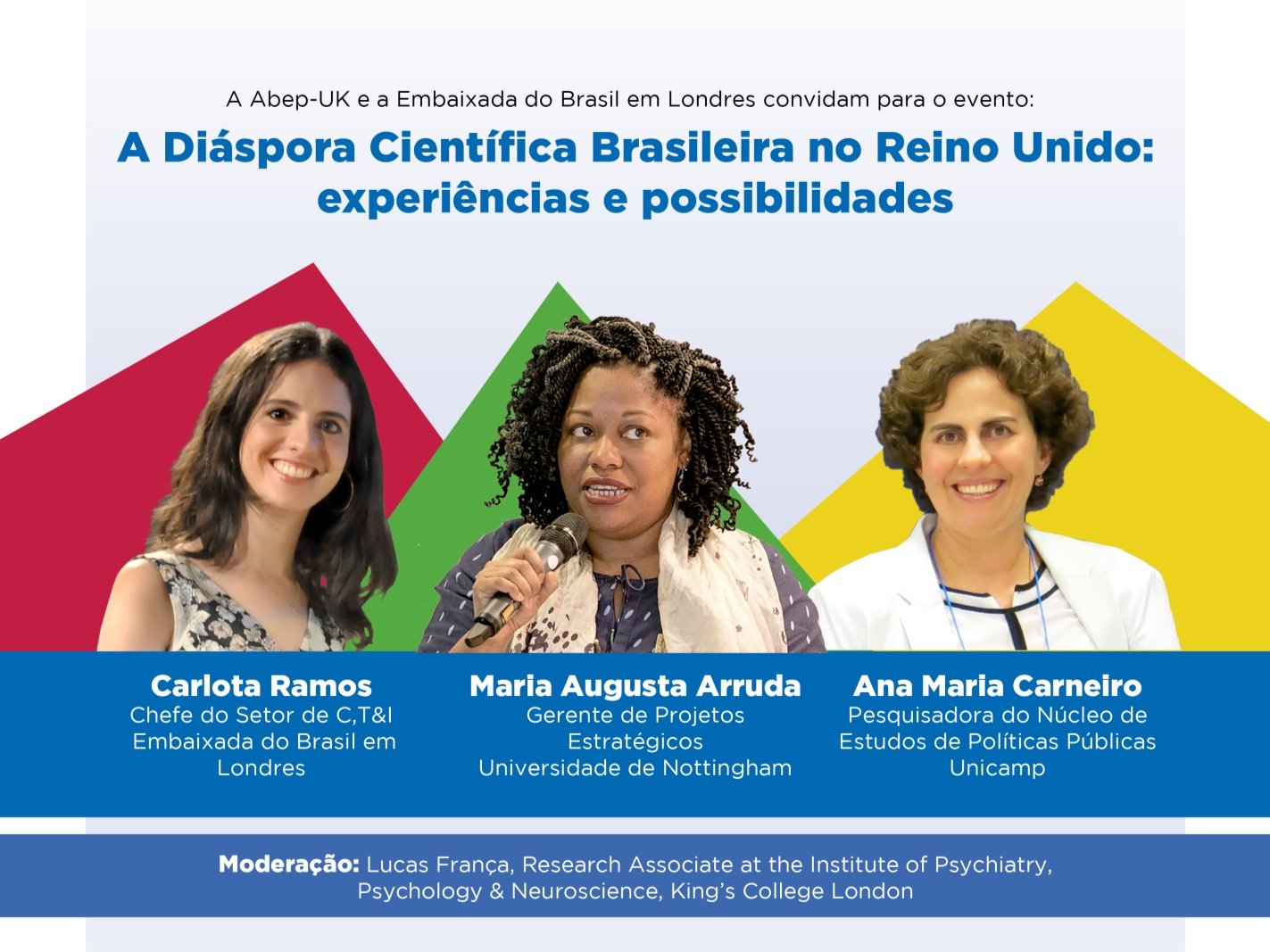The Brazilian Scientific Diaspora in the UK: experiences and possibilities
Watch the complete webinar on ABEP-UK's YouTube channel.
On the 30th of June at 1:00 PM (Brasília time) / 5:00 PM (BST), in partnership with the Science, Technology, and Innovation sector of the Brazilian Embassy in London, we held the event "The Brazilian Scientific Diaspora in the United Kingdom: Experiences and Possibilities." The event featured three invited guests engaged in the topic of the Brazilian scientific diaspora in the UK: Carlota Ramos, Head of the Science, Technology, and Innovation Sector at the Brazilian Embassy in London; Dr. Ana Maria Carneiro, Researcher at the Center for Public Policy Studies - Unicamp; and Dr. Maria Augusta Arruda, Manager of Strategic Projects at the University of Nottingham (UoN).
The event began with the opening and celebration of the 40 years of ABEP-UK with words from President Bruna Montuori, followed by a contribution from Ambassador Fred Arruda. Subsequently, former ABEP-UK President Dr. Lucas França introduced the guests, each given 10 minutes to delve deeper into the diaspora theme. The three contributions brought important reflections regarding our understanding of the Brazilian academic and scientific diaspora, a topic still underdiscussed. The diaspora raises concerns in the current crisis context, particularly for researchers and postgraduate students dealing directly with the consequences of cuts in funding for education, science, and technology.
In her presentation, Carlota Ramos discussed the mapping process carried out by the Science, Technology, and Innovation sector of the Brazilian Embassy in London in partnership with Brazilian institutions such as FAPESP and Unicamp. She highlighted the challenges and areas of attention related to the diaspora. Carlota outlined the embassy's role in assisting in mobilizing the Brazilian diaspora abroad, partnerships, and commitments to the scientific community between Brazil and the UK, as well as action possibilities for the embassy. Focusing on the diaspora, she addressed the limitations in connecting with Brazilian researchers, considering their concerns about being part of the scientific diaspora mapping. To enhance dialogue on the topic and democratize the discussion from her team's perspective, Carlota pointed out possible contributions to the current scenario: establishing cooperation ties, exchanging knowledge, identifying collaboration opportunities, synergies, and bilateral cooperation niches of interest, as well as providing subsidies for the development of public policies that can assist the issues and demands of the Brazilian academic community in the UK.
Next, Prof. Dr. Ana Maria Carneiro discussed the barriers to deepen cooperation between the UK and Brazil, primarily from the diaspora's perspective. According to the professor, there is still a lack of information on the topic and limited visibility, affecting the participation and engagement of Brazilians abroad in formal networks, such as ABEP-UK. Additionally, Ana Maria mentioned the negative perception the diaspora carries for researchers in Brazil, further hindering cooperation possibilities and closer ties between networks. The lack of interaction was pointed out as a key issue, as mechanisms supporting and recognizing the diaspora as a possible path for collaboration with Brazil are still missing. The continuity and dedication to links with Brazilian institutions also become a matter to consider, as it is a laborious and slow process. The diaspora is not consulted regarding Brazil's internationalization policies, and information circulation about interaction opportunities is low, not reaching students, researchers, and professors residing in Brazil. Discontinuity in Brazilian public policies, budget instability of national funding agencies, bureaucracy in the higher education system, and weak relations between the academic and business sectors are some of the aspects impairing interactions, dialogue, and cooperation between institutions and countries.
Ana Carneiro emphasized the urgency to know and democratize the diaspora, including its individuals, networks, and initiatives so that they gain greater visibility. Based on her experience on the topic, she stressed the importance of supporting diaspora integration, providing support for networking activities, such as events, collaborations in specific areas, or by creating opportunities for contact and discussion of common projects. In her reflections, the professor brought valuable insights on the opportunities of embracing the diaspora as a catalyst in the institutional processes between universities and Science and Technology institutions, whether for hiring professionals, evaluating programs and projects, editorial bodies of journals and periodicals, or forming scientific societies.
The third and final guest, Prof. Dr. Maria Augusta Arruda, delivered a powerful speech addressing the precarious situation of postgraduate students and researchers. Considering the fear and tension present in the daily lives of diaspora students and researchers, Maria Augusta highlighted the more subjective side of the diaspora and its consequences in the face of the barriers explored by Ana Carneiro.
In her speech, she pointed out the fear and shame associated with the diaspora, sometimes due to accusations of abandoning the country or due to contractual restrictions with funding agencies that require immediate return of researchers to Brazil. The professor posed questions aimed at constructing a different view of the theme that affects researchers' mental health and personal lives less.
How can we redefine the Brazilian diaspora and eliminate the fear and shame associated with it?
Bringing positive examples, such as the development of vaccines by Brazilian researchers abroad, and the opportunities for those who choose to build their careers abroad, the professor drew attention to the diaspora as an opportunity to expand networks and knowledge production. In conclusion, sharing her own experience as a diaspora member, the speaker concluded her speech with images of her daughter Malu Cursino, who is currently a reporter for BBC Brasil. Her experience and outcomes in personal and academic life are evidence to rethink what the diaspora means and how it can be beneficial for Brazil, especially in tragic scenarios like the current one.
Finally, after the three presentations, the event featured a Q&A session in which various topics were discussed: opportunities for researchers in Brazil who wish to immigrate to the UK, questions on how to support scientists abroad still dealing with contractual restrictions with funding agencies, and how the Embassy and institutions can collaborate through events and activities between countries to broaden this discussion, among other discussion points. The recording of the event will be made available soon in this post.
We at ABEP-UK are committed to Brazilian students and researchers in the UK and support the dissemination of the diaspora theme, as well as its demystification so that the barriers to funding for science and limitations in accessing opportunities and collaborations become increasingly smaller. We support academic diasporas in the UK and are available to provide support, promote cooperation, and expand the international network of researchers and their connections.
Come join ABEP and make this network even more powerful!

